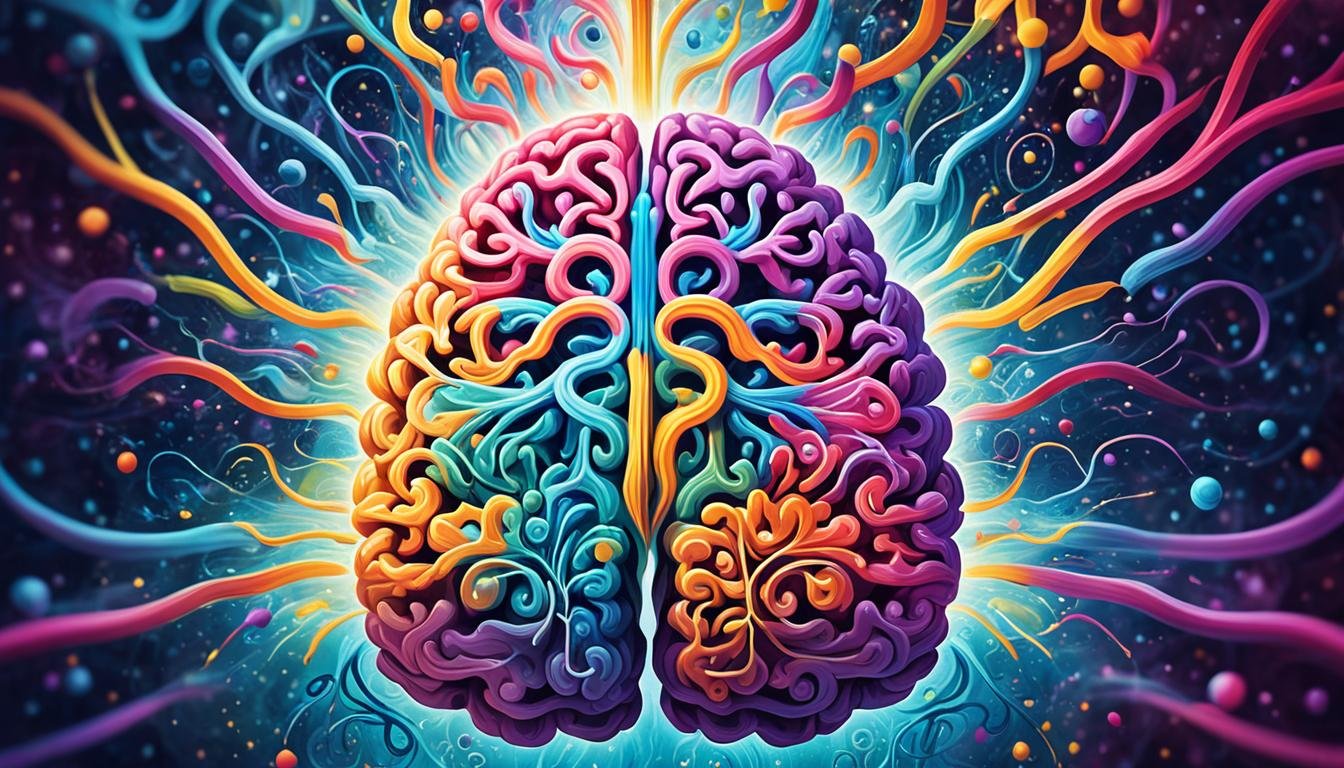Every morning, I sit with my steaming cup of green tea, starting my day of self-improvement. It’s a journey filled with small, impactful choices. With each sip, I’m not just waking up, but also boosting my mental capacity.
Like many, I’ve learned that our intelligence can change. It’s not set in stone. By making conscious choices to improve our brains, we can transform our daily lives.
Activities like jogging in the morning, meditation, and eating foods rich in omega-3 can make our minds stronger. These actions are backed by science and personal stories1.
Remember the fog from a bad night’s sleep? It can really affect our memory1. These experiences connect us, leading us to discover new ways to improve our minds. Let’s explore habits that boost our mental capacity and make life richer.
Key Takeaways
- Intelligence can be cultivated and enhanced through lifestyle choices.
- Physical exercise is pivotal in promoting neuron growth and enhancing brain structure.
- Sleep is a non-negotiable pillar for retaining memory and learning effectively.
- Meditation, even in short durations, contributes to improved cognitive functions.
- Nutrition, including Omega-3 fatty acids and flavonoids, plays a critical role in brain health and cognitive abilities.
The Importance of Sleep for Enhanced Mental Capacity
As someone deeply invested in the quest to increase cognitive abilities and enhance problem-solving skills, I’ve learned that sleep is key. It’s not just for rest; it’s vital for mental sharpness. Research shows that not sleeping well can cut our learning power by up to 40%. This shows how big an impact sleep has on our minds2.
Sleep has different stages, including NREM and REM sleep. Each stage is important, with REM sleep helping us link memories and solve problems3. If these stages get disrupted, it can hurt our thinking skills, affecting memory and judgment3.
Poor sleep can lead to cognitive decline and even Alzheimer’s disease. In fact, up to 15% of Alzheimer’s cases might be caused by not sleeping well3. This fact is scary, making us look for ways to improve sleep, especially for older people who lose a lot of deep sleep2.
Good sleep boosts creativity and innovation. It helps the brain reorganize information and make new connections between thoughts3. This is key for finding new solutions to tough problems or growing our creative skills.
| Age Group | Impact of Sleep deprivation on Learning% | Impact on Problem Solving Ability% |
|---|---|---|
| Young Adults | 40 | Highly Affected |
| Adults Over 60 | 70 (loss of deep sleep) | Moderately Affected |
| General Population | Variable | Widely Affected |
The quality of sleep after learning is just as important as the night before. This is especially true for students and those who keep learning. It shows how crucial rest is for enhancing problem-solving skills and staying sharp2.
We need to see how sleep and thinking go hand in hand. Making our sleep better can be a big step towards improving our minds. It’s not just about sleeping more; it’s about sleeping in a way that helps our brains work better.
Regular Exercise: A Path to Improved Brain Function
Regular exercise is great for your body and brain. It boosts your mental and physical strength. Activities like aerobics and strength training help your brain and body work better.
Impact of Physical Activity on Neural Growth
Exercise changes the brain, especially the hippocampus, which helps with memory and learning. Studies show it can make the brain grow and improve memory4. Aerobic exercises help animals and humans with memory and learning problems, showing how important exercise is for brain health4.
Exercise and Its Correlation with Cognitive Performance
Exercise makes you stronger and smarter by making your brain work better. For example, exercises that make your heart beat faster help your brain stay flexible and improve memory4. This flexibility is important for learning new things and facing new challenges.
High-intensity workouts also help your mental health, showing exercise can make your brain and intelligence better at any age4.

Adding exercise to your daily life might seem hard, but it’s worth it. It makes your brain work better and supports good mental health and thinking skills. Start with small steps and slowly increase the intensity to fit your health and fitness goals.
Starting to move more is the first step to making your brain and body better. It’s time to use exercise to change your life, not just your body.
Meditation Techniques for Elevating Intelligence Skills
Meditation is more than just a way to focus. It can change how we think and learn. Studies show it can make our minds sharper and improve our thinking skills.
When we meditate, our brain’s hemispheres work better together. This makes our thinking faster and more powerful5. It helps us grow smarter and remember things better. Researchers at the University of Wisconsin found that meditation makes the brain stronger in key areas5.
Meditation changes brainwaves to help us be more creative and think better5. Just four days of it can make us concentrate and remember things better6. It also helps us learn and remember for a long time6.
Deep meditation can even make us smarter and more emotionally aware. It reduces stress and makes us happier and better learners5. This is because it changes the chemicals in our brain, making us feel better and think clearer5.
Let’s look at how meditation can make us smarter with regular practice:
- Improves brain areas for learning, memory, and feeling emotions5
- Helps with anxiety and sleep problems, leading to better sleep5
- Makes our brain stronger by creating new neurons5
- Gives us more willpower, motivation, and focus to reach our goals5
These benefits come from practicing meditation daily, even just 20 minutes. It can make us feel better, less stressed, and think clearer6.
| Area of Impact | Effect of Meditation |
|---|---|
| Cognitive Functioning | Increases processing power, creativity, memory |
| Emotional Intelligence | Enhances emotional recognition, stress management |
| Brain Structure | Thicker gray matter, enhanced neural regions |
| Brain Chemistry | Optimizes beneficial chemicals, reduces harmful ones |
By using these meditation techniques and practicing regularly, we can improve our thinking skills. Meditation can make our minds stronger and more resilient. Start meditating today and see how it can change your life.
Dietary Choices to Boost IQ Levels
Exploring how diet affects IQ levels and supports brain training shows us food’s big role. Foods rich in Omega-3 fatty acids, flavonoids, and Vitamin K are key. They boost brain functions and health.
Omega-3 Fatty Acids and Brain Health
Omega-3 fatty acids are vital for brain health. They’re found in oily fish and help increase blood flow to the brain, improving thinking7. Eating fish at least twice a week can lower dementia and mental decline risks, especially in older people8.
The Role of Flavonoids and Vitamin K in Cognitive Abilities

Flavonoids in berries and veggies help brain health by fighting inflammation and making brain cells more flexible7. Vitamin K in greens like kale supports brain cell survival and keeps cognitive skills sharp7. These nutrients are crucial for a healthy brain and a good brain training program.
Eating foods rich in these nutrients can improve memory, focus, and lower the risk of brain diseases. Adding these brain-boosting foods to daily meals can create a natural brain training plan. This can help increase cognitive abilities and boost IQ levels.
Stimulating Your Mind Through Music
Music is more than just a cultural joy; it boosts brain function. It’s a key part of a brain training program. By exploring music, you improve your hearing and boost your memory, attention, and problem-solving skills.
Studies by Brain.fm show how music made for brainwaves can keep you focused and clear-headed longer than regular music9. This music fits into brainwave types like Beta, which helps with active thinking and solving problems9.
Old studies also highlight music’s benefits. Listening to classical music before bed helps calm the mind and improves sleep quality, which is key for thinking well10. These sounds also boost visual memory and lower stress levels, helping your brain stay healthy and quick10.
| Music Type | Benefits | Brainwave Influence |
|---|---|---|
| Brain.fm Specialized Music | Extended focus, cognitive clarity | Beta Waves (12-30 Hz) |
| Classical Music | Better sleep, enhanced visual memory | Theta Waves (4-8 Hz) and Alpha Waves (8-12 Hz) |
Starting a brain training program with music can be powerful. Whether it’s Brain.fm’s tracks or carefully chosen classical music, each has its own role in boosting your brain.
Adding these musical sessions to my daily life sharpened my focus and improved my problem-solving and creative thinking. It’s amazing how music and rhythms can make your mind sharper for both creative and analytical tasks.
Music isn’t just an art form; it’s a gateway to a sharper, more productive brain.
Embracing New Languages for Cognitive Enhancement
Learning a new language is more than just memorizing words and rules. It’s a journey that boosts your brain and makes you sharper. It challenges your brain, helping it grow and improve your memory, focus, and problem-solving skills1
The Linguistic Road to Enhancing Problem-Solving Skills
Knowing more languages makes you smarter. A study in the Journal of Applied Cognitive Psychology found that bilingual or multilingual people are better at solving problems1

How Multilingualism Can Contribute to Intelligence
Learning new languages changes how our brains work, making them more flexible and sharp. Studies show that practicing new words helps turn short-term memories into long-term knowledge2
Being multilingual opens us up to new cultures and feelings, making us more empathetic. It boosts our language skills and helps us connect better with others. This can make us smarter and more flexible in thinking.
Learning new languages shows how engaging in tough activities can make our brains better. As we get better at languages, we also get better at communicating, solving problems, and thinking creatively.
Creating a Brain Training Program with Effective Habits
To boost brain power, it’s key to make a brain training plan. This plan should include activities backed by science. These activities help improve brain health by solving puzzles and learning new skills.
Doing puzzles can help keep your brain sharp as you age11. Card games also boost brain size in certain areas11. These games are a big part of my daily brain workout.
Designing a Personalized Schedule for Cognitive Improvement
Adding a new habit means making it fit into your daily life. Linking new brain exercises with daily tasks makes sticking to them easier12.
It’s important to set achievable goals for your brain training. Goals that are realistic keep you motivated and help you see progress without getting frustrated12. Learning something new, like a musical instrument or a language, keeps your brain busy and challenged. Studies show that learning new skills can improve memory in older people11. Being bilingual can also boost memory and spatial skills11.
Identifying the Key Components of a Successful Intelligence Training Regimen
A good brain training plan needs to be consistent and fun. Starting training in the morning works best when you’re most focused12.
Even on tough days, doing just one exercise can help you stay on track. Making the exercises fun and changing them often keeps you interested. This is key for keeping your brain sharp12.
Life can get busy, but your brain training plan should be flexible. You can catch up on missed sessions without feeling guilty. This approach helps you keep improving your brain without stress12.
Putting these ideas together creates a lasting habit that boosts your mental abilities. With a personalized plan based on science, improving your brain’s functions is within reach.
Understanding the Types of Intelligence
Exploring ways to improve our minds means understanding the different kinds of intelligence. Howard Gardner’s Theory of Multiple Intelligences shows us a wide range. This includes Logical-Mathematical, Linguistic, Interpersonal, Intrapersonal, Musical, Visual-Spatial, Bodily-Kinesthetic, Naturalist, and Existential Intelligence13.
Each type of intelligence has its own strengths. For example, about 15% of people are Bodily-Kinesthetic learners. They are great at physical activities and tasks that involve motion14. Those with Spatial abilities are excellent at seeing and understanding the layout of things around them14.
Knowing what kind of intelligence you have helps with personal growth and choosing a career. Jobs for Logical-Mathematical Intelligence include being a mathematician or computer analyst. You need strong reasoning skills for these jobs13. People with Musical Intelligence might work in music therapy or composition13.
This knowledge helps us create better personal development plans. It lets us use our specific intelligence types well. This way, we make the most of our education and work, improving our lives and how we help others13.
To really improve intelligence programs and boost our skills, we should work on all types of intelligence. Not just the ones we naturally do well in. This approach makes our minds stronger and more flexible, ready for any challenge life brings.
Practical Mindfulness: A Tool for Thought Clarity
In today’s fast-paced world, finding clear thoughts can be hard. Mindfulness is more than a trend; it’s a key way to improve our thinking. It helps us stay aware of our thoughts, feelings, and surroundings in a caring way.
I’ve found many mindfulness techniques that help clear my mind and focus better. Meditation is a big part of this, where you sit quietly and notice your thoughts and feelings. Doing this regularly can make you think better, especially in paying attention and changing your mind easily15.
Controlled breathing is another tool I use to calm my thoughts. It means focusing on slow, deep breaths to calm your mind. This helps you think better and feel less anxious15.
Being mindful also helps with stress and anxiety, making hard tasks easier and boosting productivity15. People who practice mindfulness often feel less stressed and more satisfied with their jobs15.
One big plus is being able to step away from upsetting situations. Mindfulness meditation helps with this. It makes your mind clearer and helps you make better choices16.
Studies back up the benefits of these practices. For example, a study showed that mindfulness reduced anxiety and depression in some people16. Long-term meditators also did better in focusing and changing their thoughts easily16.
| Technique | Benefits |
|---|---|
| Mindfulness Meditation | Increases focus, enhances cognitive flexibility, reduces anxiety and depression15. |
| Controlled Breathing | Improves cognitive processing, reduces stress, stabilizes emotions15. |
| Regular Practice | Boosts cognitive functions, lowers emotional exhaustion, enhances job satisfaction1615. |
Adding mindfulness to our daily lives is a great way to improve our thinking. Whether it’s through meditation, breathing exercises, or other mindfulness activities, we can all get clearer minds and think better.
Leverage the Powers of Caffeine: Coffee and Green Tea
To boost my IQ and improve my brain training, I’ve started drinking coffee and green tea daily. These drinks have mild stimulants and antioxidants that help keep my brain healthy.
Enhance Attention with Caffeine Intake
Drinking coffee in the morning has changed how I focus and think. It has a lot of caffeine, about 150 mg per cup, which wakes me up and helps me do complex tasks better17. Green tea is a softer choice. It has less caffeine, around 40 mg per cup, and helps me think clearly without making me feel jittery17. The L-theanine in green tea works well with caffeine to keep me focused and going strong, making it perfect for my brain training.
The Cognitive Benefits of Epigallocatechin Gallate (EGCG) in Green Tea
I was curious about how to make my brain work better naturally. I found out that green tea has a lot of catechins, especially EGCG. This antioxidant is great for brain health, protecting and growing neurons. It’s important for keeping my brain quick and agile as I get older18. The mix of caffeine and catechins in green tea gives me energy and clear thinking, helping me improve my IQ.
Using coffee and green tea together in my routine helps me keep getting better at thinking. Every morning, I enjoy their unique tastes and how they make me sharper. It’s a key part of my brain training, using natural ways to boost my brain.
Finding the right mix of coffee and green tea has made my life better. It gives me better focus, energy, and sharp thinking. By choosing when to drink these, I use their benefits to improve my brain function, increase my daily productivity, and keep my brain healthy for the future.
Boost Intelligence Program: Strategies to Increase Cognitive Abilities
Starting a journey to boost your brain power can be thrilling and rewarding. It’s key to focus on both your mind and body for success. This approach is essential for a strong boost intelligence program.
One important strategy is using relational frame theory (RFT). RFT helps you connect different ideas better. This skill is vital for better thinking and adapting over time19.
Training programs like SMaRT use exercises that make you think relationally. These exercises have been shown to boost IQ scores a lot19. They’re more effective than old methods, like working memory training, which only improves IQ a little19.
Doing brain exercises isn’t just about thinking hard. A study in 2017 found that playing card or board games regularly can help prevent brain decline20. Being active in your community also helps keep your mind sharp20.
Learning new languages or music can also boost your brain power. Bilingual people often have stronger brain connections, which may help prevent Alzheimer’s disease20. Playing a musical instrument not only adds to your skills but also protects your brain as you age20.
Don’t forget about the importance of staying physically fit for better brain health. Activities like tai chi improve brain connections and boost memory20.
By following these steps, you can create a supportive environment for boosting your brain power. This leads to better thinking skills and a healthier brain.
Conclusion
Looking at how education, mental exercises, and lifestyle choices work together, I’ve seen how they help us improve our mental abilities. Each one plays a big role in making our minds sharper and boosting our IQ. Studies show that more education can increase IQ scores by 1 to 5 points2122.
Intelligence can grow with time, effort, and experience. This means a strong boost intelligence program can lead to a sharper mind and better brain function.
Research shows that pushing through with education has big benefits. For example, making education mandatory for 2 years more can increase IQ scores by nearly 3.7 points in males21. Also, finishing college can give you a big intellectual edge later in life21.
Just 15 minutes of daily mental exercises can improve your thinking skills. This is also advised by the Office of the Director of National Intelligence for better critical thinking23.
I believe in making learning a lifelong commitment. It’s the best way to invest in your brain’s future. By learning, doing mental exercises, and staying healthy, you can reach new heights in thinking. This leads to better work performance, health, and a longer life21.
This shows how facing challenges can prove our mental strength. It’s all about using our brains to the fullest.
FAQ
What daily habits can enhance my mental capacity?
How does sleep contribute to increased cognitive abilities?
Can physical exercise really improve brain function?
What are some meditation techniques for elevating intelligence skills?
How do dietary choices impact IQ levels?
Can listening to music improve brain function?
How does learning new languages enhance problem-solving skills?
What should I include in my personalized brain training program?
Why is understanding different types of intelligence important?
What is practical mindfulness, and how can it improve cognitive function?
How does caffeine from coffee and green tea boost IQ levels?
What strategies are included in a Boost Intelligence Program?
Source Links
- How to Become Smarter: 10 Ways to Boost Your Intelligence – https://www.healthline.com/health/how-to-become-smarter
- Sleep On It – https://newsinhealth.nih.gov/2013/04/sleep-it
- How Lack of Sleep Impacts Cognitive Performance and Focus – https://www.sleepfoundation.org/sleep-deprivation/lack-of-sleep-and-cognitive-impairment
- Effects of Physical Exercise on Neuroplasticity and Brain Function: A Systematic Review in Human and Animal Studies – https://www.ncbi.nlm.nih.gov/pmc/articles/PMC7752270/
- No title found – https://eocinstitute.org/meditation/increase-your-intelligence-with-meditation/
- How Meditation Increases Your Intelligence (in just 20 minutes a day) – https://www.linkedin.com/pulse/how-meditation-increases-your-intelligence-just-20-minutes-hampton
- 12 best brain foods: Memory, concentration, and brain health – https://www.medicalnewstoday.com/articles/324044
- Foods That Help You Focus – https://www.webmd.com/add-adhd/ss/slideshow-brain-foods-that-help-you-concentrate
- Music to Focus Better – Brain.fm – https://www.brain.fm/
- How Music Can Boost Your Intelligence – https://medium.com/an-idea/how-music-can-boost-your-intelligence-3b6290f5ea01
- Brain Exercises: 13 Ways to Boost Memory, Focus, and Mental Skills – https://www.healthline.com/health/mental-health/brain-exercises
- 7 ways to make brain training a habit | NeuroNation – https://www.neuronation.com/science/en/7-ways-to-make-brain-training-a-habit/
- What are the 9 Types of Intelligence? | PBIS | Nord Anglia – https://www.nordangliaeducation.com/pbis-prague/news/2020/12/09/the-nine-types-of-intelligence
- 8 Different Types Of Intelligence (And How They Learn) – https://www.thinkific.com/blog/intelligence-types/
- From Chaos to Clarity: Personal Insights on the Power of Mindfulness – https://www.linkedin.com/pulse/from-chaos-clarity-personal-insights-power-rafsan-billah-mgydc
- What are the benefits of mindfulness? – https://www.apa.org/monitor/2012/07-08/ce-corner
- Coffee cues elevate arousal and reduce level of construal – https://philarchive.org/archive/CHACCE-3
- Best Cuppa Alternatives 2024 – https://medium.com/@jamesgondola/best-cuppa-alternatives-2024-0591568fe16c
- A Brand New Way To Boost Your Intelligence – Steven C. Hayes, PhD – https://stevenchayes.com/a-brand-new-way-to-boost-your-intelligence/
- Brain exercises: 22 ways to improve memory, cognition, and creativity – https://www.medicalnewstoday.com/articles/brain-exercises
- How Much Does Education Improve Intelligence? A Meta-Analysis – https://www.ncbi.nlm.nih.gov/pmc/articles/PMC6088505/
- How Much Does Education Really Boost Intelligence? – https://www.psychologytoday.com/us/blog/brainstorm/201806/how-much-does-education-really-boost-intelligence
- Critical Thinking and Intelligence Analysis: Improving Skills – https://www.amu.apus.edu/area-of-study/intelligence/resources/critical-thinking-and-intelligence-analysis/





